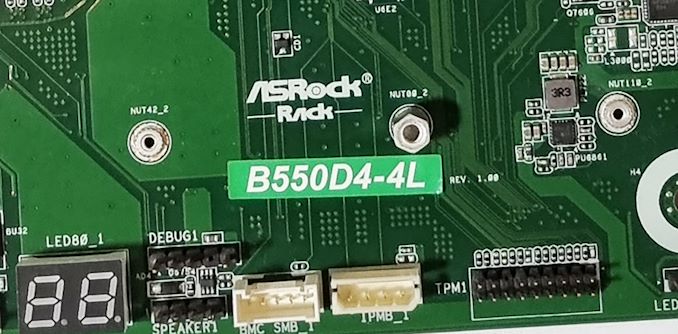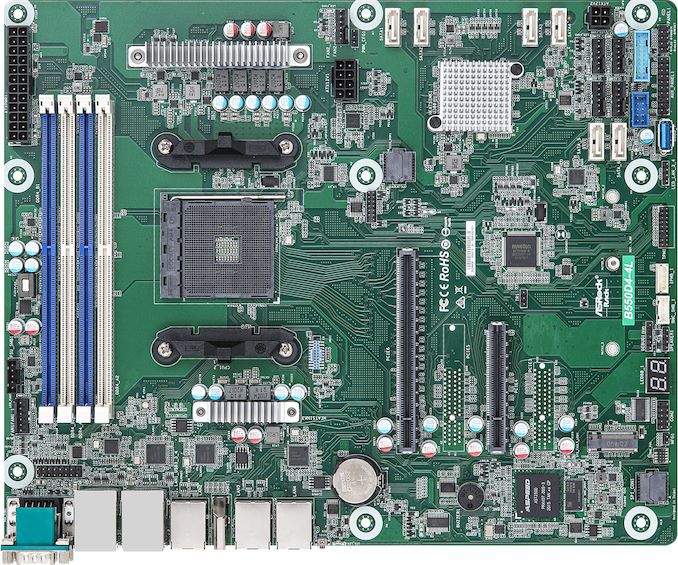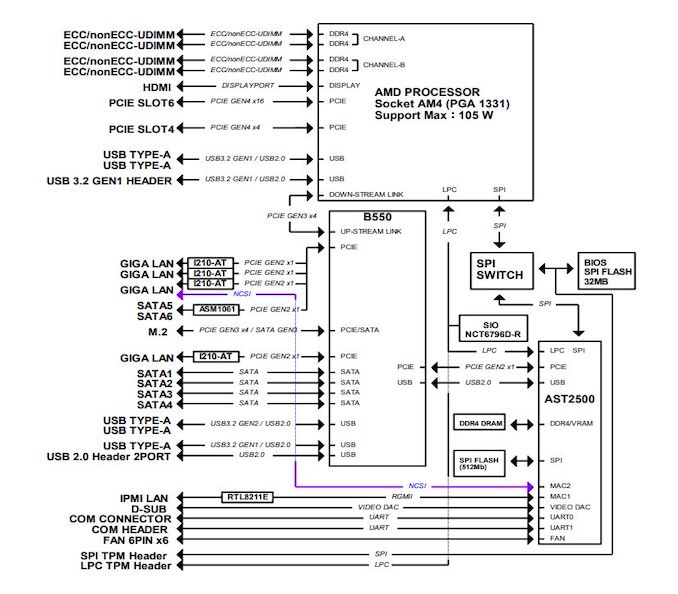ASRock Rack B550D4-4L Motherboard Review: B550 Goes Professional with BMC
by Gavin Bonshor on May 20, 2021 9:00 AM EST
Over the last year, we've seen several B550 models, with the vast majority of these catering to desktop users and gamers looking for a cost-efficient option to use with AMD's Ryzen processors. Back in January, we reported that ASRock Rack had readied up a new B550 model with a more professional flavor, the B550D4-4L. The B550D4-4L features support with a broad range of AMD Ryzen processors, including 5000, 4000G, and 4000 Pro, with support for most 3000 series processors. Some of the board's core features include Gigabit Ethernet, support for 128 GB of DDR4 memory, and an ASPEED BMC controller for management over a network. We get to grips with the ASRock Rack B550D4-4L and see how it compares to other AM4 models in our latest motherboard review. It came with a few surprises as well.
ASRock Rack B550D4-4L Overview
Perhaps considered one of the most 'interesting' motherboards based on the B550 chipset is the ASRock Rack B550D4-4L. At the time of writing, the B550D4-4L is the only B550 board known to us that includes a BMC controller. It is designed to utilize the power and high-core count of AMD's Ryzen 5000 and 3000 desktop processors, with support also available for AMD's Ryzen Pro 4000 series and some Pro 3000 Processors.

The ASRock Rack B550D4-4L has a transposed AM4 socket and transposed memory slots
Looking at the overall design, it is focused on professional use and uses a standard green PCB. The B550D4-4L opts out of fanciful aesthetics and instead focuses on core functionality. Along the top is four memory slots which are horizontally mounted, with support for up to 128 GB DDR4-3200, both ECC with supported Ryzen Pro processors and non-ECC memory on the regular Ryzen desktop models. The B550D4-4L has one full-length PCIe 4.0 x16 slot and one half-length PCIe 4.0 slot. For storage, there's just one M.2 slot but is only capable of supporting PCIe 3.0 x4 or SATA drives, as well as six SATA ports, four from the chipset and two from an ASMedia controller.
The rear panel has four Intel Gigabit Ethernet ports, with a fifth Ethernet port for the board's ASPEED BMC controller, allowing remote access to the system over a network. Other connectivity includes an HDMI output for use with processors with integrated graphics and a D-Sub output (DB15) for the BMC, and four USB Type-A ports, two USB 3.2 G2, two USB 3.2 G1. ASRock Rack also includes a serial connector (DB9). The B550D4-4L also has a USB 3.2 G1 header providing a further two ports, a USB 2.0 header for two ports, and six 6-pin fan headers.
ASRock B550D4-4L Block Diagram
Looking at performance, the B550D4-4L was surprisingly competitive in our computational-focused benchmarks, with the board using AMD's Precision Boost Overdrive at default. This is above simply doing a good turbo, making the board perform a lot better than we would assume.
One downside in performance was perhaps the memory - it ran at DDR4-3200 CL22 as opposed to other B550 models we tested at DDR4-3200 CL16, and no matter what values we put in for the latencies, they stayed at JEDEC CL22.
The B550D4-4L also proved competitive in our system testing, with faster than expected POST time performance. It showed lower power consumption in long idle and idle power states than most boards, while power consumption at load was comparable with other models on test. The board's DPC latency performance isn't great, but it doesn't include any form of audio codec or audio output regardless.
The ASRock Rack B550D4-4L is a unique B550 model, with not much competition in the way of server-focused models. ASRock also has a model based on the propriety deep mini-ITX form factor, the B550D4ID-2L2T, which uses the B550 chipset for more professional level function. Unlike other B550 models, the B550D4-4L disables overclocking, which is understandable given its lack of heatsink capability on the power delivery, highlighting that this board isn't for pushing the boundaries or requires a system with strong airflow.
The real capability comes for users looking to build a Ryzen desktop-based server with the associated performance levels at default settings, along with added functionality for both Ryzen Pro series processors and the ASPEED BMC controller allows access and control of the system remotely. It's also the only B550 model to feature four dedicated Ethernet controllers, and it makes it one of the most interesting AM4 models we've received for review so far.
Read on for our extended analysis.











73 Comments
View All Comments
mode_13h - Monday, May 24, 2021 - link
I can understand the sentiment of wanting 10G to take hold, so that prices will come down.Some of ASRock Rack's boards do have an option that includes a 10 Gigabit controller. I've had my eye on the X570D4U-2L2T, in fact.
I think the reason this probably lacks 10 Gigabit is that they have two X570-based boards with 10 Gigabit (and one without). The point of the B550 board is to be lower-priced. So, if someone wants it, they can easily just step up to one of the X570s that has it.
spikebike - Tuesday, December 28, 2021 - link
The article mentions a variant of the B550d4 with 2x10G.fmyhr - Thursday, May 20, 2021 - link
Would many of this board's prospective users really use a GTX 980 and 1200W 75% PSU? Personally if I'm willing to spend that much electricity on a server, I'd go EPYC. The benefit of this board AFAICT is the ability to construct a true Ryzen server (i.e. ECC RAM and OoB management) that uses less power, and may cost less, than EPYC. Tradeoff is far less I/O bandwidth, and lower limit on CPU cores. Anyway, back to point: to lower power use with this you'd want to match power supply to actual requirement, something ~400W, preferably 90+ Gold or better efficiency, is probably a lot more appropriate.Einy0 - Thursday, May 20, 2021 - link
Agreed, I'd much rather see power consumption numbers using just the BMC for video and an appropriately sized power supply.dsplover - Thursday, May 20, 2021 - link
Excellent niche board, perfect for Pro Audio Workstation, as well as a 1U build.Just need the 5700G to get me to jump.
Nice Review
hansmuff - Thursday, May 20, 2021 - link
"The only negative in performance came in our DPC latency testing, with our results showing that this board isn't suitable for DAW systems."dsplover - Thursday, May 20, 2021 - link
DPC Latency is of no concern as I run an external DSP Audio/MIDI Interface.Been using ASRock Rack boards for years, even though they “bench” poorly.
It’s the stability that counts for me. They are pricey but then so am I....
hansmuff - Tuesday, May 25, 2021 - link
Fair enough!edogawaconan - Thursday, May 20, 2021 - link
From the manufacturer's page:"For AMD Ryzen Desktop Processors with Radeon Graphics, ECC support is only with Processors with PRO technologies"
Pretty sure this means only G series of Ryzen don't have ECC support.
fmyhr - Thursday, May 20, 2021 - link
As best I've been able to determine, Ryzen APUs do not support ECC unless they're of the "Pro" variety. Read somewhere this is because the iGPU must also support ECC, and most of them do not. Don't know why AMD makes this info so difficult to find out, OR why they've so far shipped Pro APUs only to OEMs, none to retail. It's like they don't WANT to compete with Xeon E3. </rant>